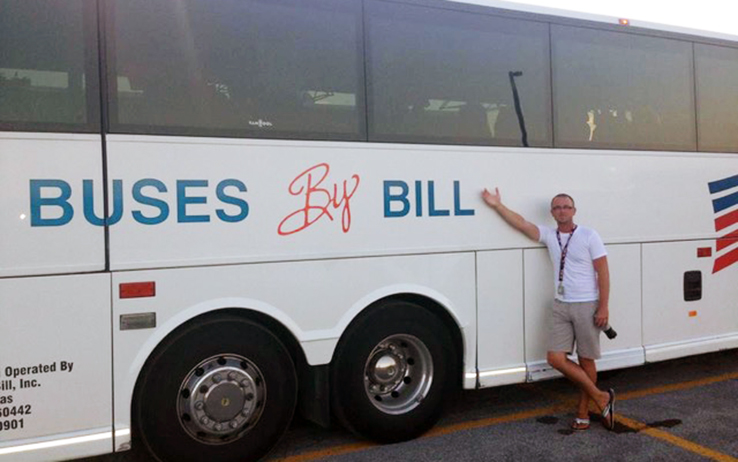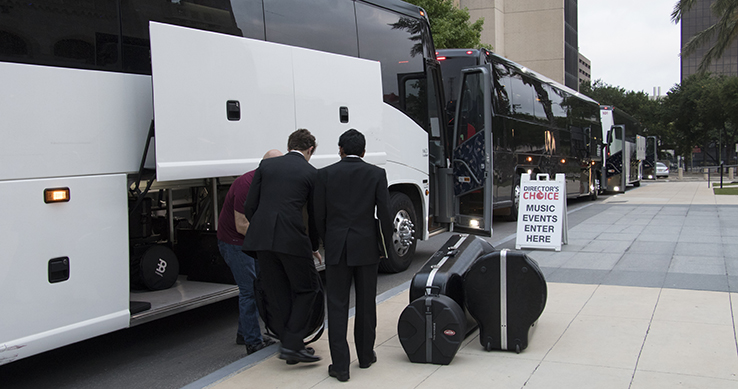
Our high school marching band has hit the road each year since we opened in 2008. Along the way, I’ve discovered – through trial and error – what works and what doesn’t work when it comes to traveling with a marching band. Hopefully, by sharing some of what I’ve learned, I can save you from some “how not to do it” experiences.
This Isn’t Our First Rodeo
Competing in Texas is a unique experience as it can take up to six hours to reach one of the BOA contest sites, and often this can involve an overnight trip just to ensure the safety and comfort of the kids, parents, and drivers. In addition, our school, Claudia Taylor Johnson, is fortunate to have a community that enjoys the opportunity to travel out of state every other year for a larger trip. In 2013/14, we traveled to Pasadena, California to perform in the Tournament of Roses Parade, and in the spring of 2016, we traveled to NYC/Washington DC to perform at Carnegie Hall and visit the National Mall. We also make the trip to Indianapolis every few years to perform at Grand Nationals and are looking ahead towards either Pearl Harbor, Hawaii or Disney World in Orlando for our next parade.
In-State Travel
Looking at competitive travel, the closest BOA Regional to San Antonio outside of the Super Regional each year is Austin, TX. For “in-state” travel, I will either do the logistical planning myself or utilize Director’s Choice Tour and Travel, a local company here in Texas with a great knowledge of the facilities. This trip takes upwards of 90 minutes due to traffic. For trips longer than an hour, we try to consider the comfort and parents of the students and opt for charter buses. The charter buses allow everyone to rest and be at their best when they come off the bus, and they can sleep on the way home from the contest.

It is important to us that the coach company we use provide newer, clean uses – more than it is important that we get the “best deal.” I have traveled with drum and bugle corps for more than ten summers, and know that one area you don’t “cut corners” to save a few bucks is on buses. We want to have drivers who understand what they’re getting into for the day – the long hours, the kids on and off the bus, and also a bus company that has a reputation for coming through with a backup bus or driver in a crunch situation.
When we are driving on Interstate Highway 10 from San Antonio to Houston, the last thing we want to worry about is a bus breakdown with no alternative or repair option lined up. I recommend everyone asking your bus company what they would do in the event of a breakdown. You might also consider going to the bus depot and looking at some of the coaches the kids will ride – are they clean? Does the restroom work? This becomes even more important on overnight bus trips.
In 2013, we had a stomach flu move quickly through the band on the way home from California, and more than 80 kids were sick – even some of the drivers were sick. It was like something out of a movie – except it was real life. At the same time, we had a tire blow-out on one of the buses and had to divide up one bus amongst four others. Sometimes – the worst case scenario happens, regardless of the best plans. Knowing that anything is possible while traveling, and always leaving extra time, and communicating is key.
Arriving the Night Before
On the day of a competition, if we have an early morning time, we will often travel to the location the night before to avoid the kids having to get up at 1:30 am or 2:00 am and then take a 3-hour bus ride to the contest site. By getting a hotel, we can sleep an extra few hours, drive the night before, and ensure that all the equipment/trucks have made it safely to the city.
An equipment truck breakdown on the day of contest can be very unnerving. Our goal during competition travel is to keep the kids comfortable, rested, and feeling pampered like rock-stars. They have one job during that time, which is to perform at the highest level possible. If staying at a hotel was not possible due to cost or location, we would do sleeping bags on a gym floor at a local school – I still believe having them all together, and getting the uninterrupted sleep is a better scenario than traveling the day of contest, whenever possible.
Out-of-State Trips
For out of state trips, while I can see the benefits of “do-it-yourself” travel, I highly recommend going with an experienced tour and travel provider. These companies benefit from having worked with groups from all over the country, so they know the pros and cons of many trips, events, sites, etc. We have worked well with Director’s Choice and Music Travel Consultants.
Our Grand Nationals Trips are always with MTC, as they have a wonderful relationship with the city of Indianapolis, and we used Director’s Choice for our Carnegie Hall trip and found the festival to be exceptional. It is a great comfort to have a tour guide with you on the trip to handle all of the logistics from check-in at the airport and hotel, to any problems with rooms or facilities, and take the pressure off the director. Of course, there is a cost associated with using any service, but the benefits of the service far outweigh the negatives of paying a bit extra in my opinion.
 Where Should We Go?
Where Should We Go?
In terms of how we select where to go, we often ask the kids “where do you want to go?” Once we have their feedback we begin researching great performance opportunities in these areas. We poll parents based on cost and time and try to miss as little school as possible. We don’t want the kids only to experience Grand Nationals, as we believe there is a lot more out there to performing in great places beyond competition. Our hope is that each band member in our program goes to Nationals once, and gets to enjoy a few other experiences in addition to that.
Timing
To close, I have one suggestion that I can’t stress enough. I believe that successful planning two years ahead of the anticipated travel date will set your program up for a wonderful experience.
Really.
I’d also suggest that you reach out to multiple other programs who have traveled where you are looking at going to see what advice they have to offer to help. Again, take advantage of the experiences others have had. There’s no point in duplicating anyone’s “how not to do it” trips.